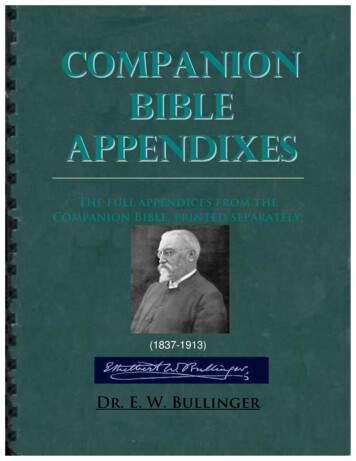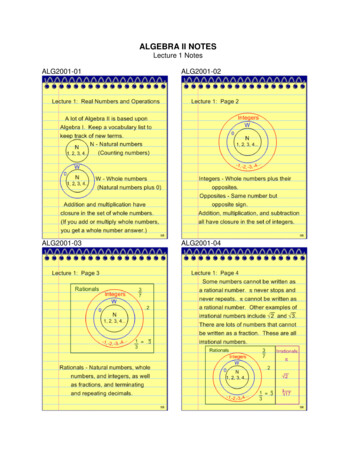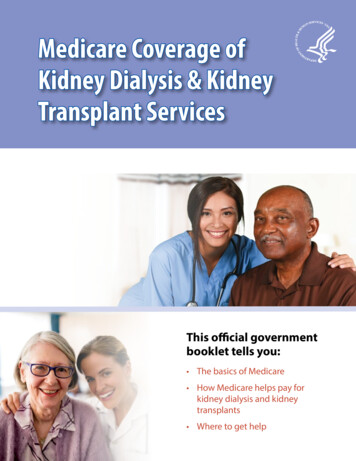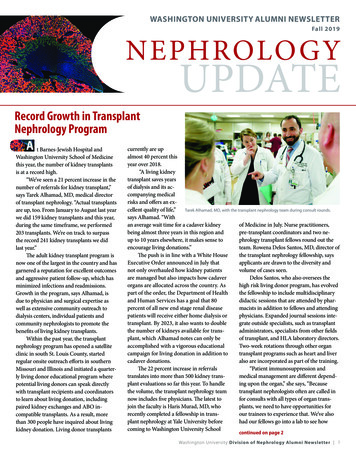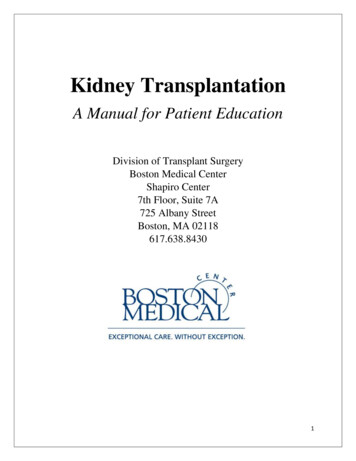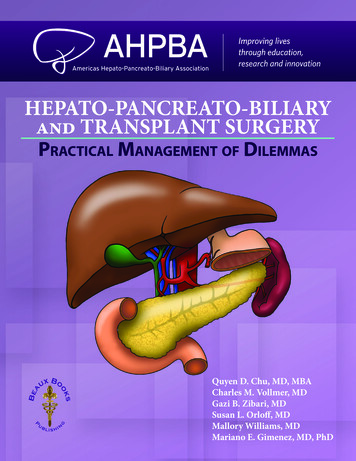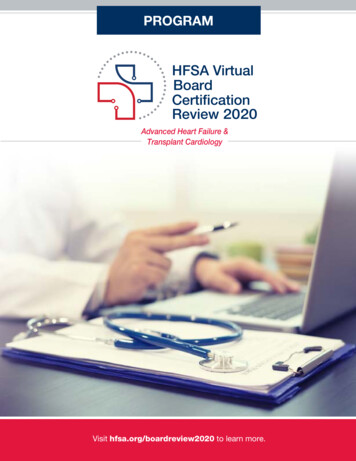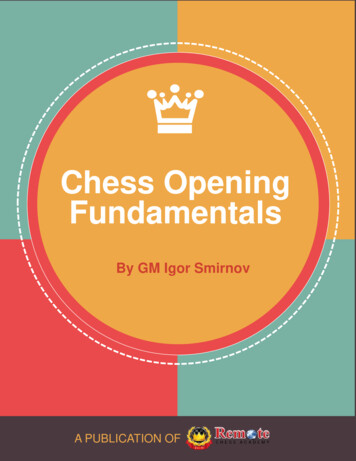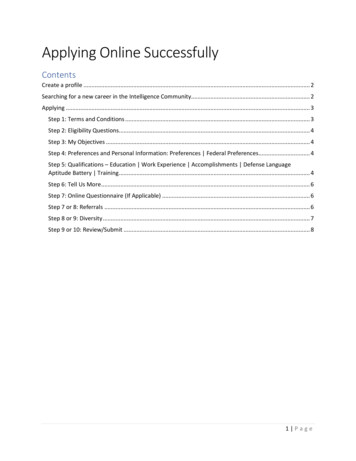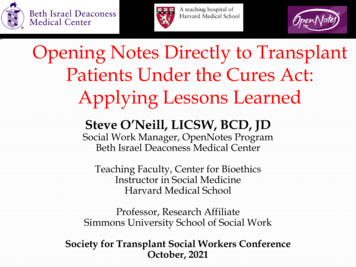
Transcription
Opening Notes Directly to TransplantPatients Under the Cures Act:Applying Lessons LearnedSteve O’Neill, LICSW, BCD, JDSocial Work Manager, OpenNotes ProgramBeth Israel Deaconess Medical CenterTeaching Faculty, Center for BioethicsInstructor in Social MedicineHarvard Medical SchoolProfessor, Research AffiliateSimmons University School of Social WorkSociety for Transplant Social Workers ConferenceOctober, 2021
No Conflicts .to report Funding sources: Cambia Health Foundation,Gordon and Betty Moore Foundation, PetersonCenter on Healthcare, Robert Wood JohnsonFoundation2
OpenNotes What is OpenNotes? What is OurNotes?3
Goals Share our own, as well as the nationalexperience, with fully open clinical notes,particularly in mental health Notes as (narrative) therapy forbehavioral health and mental illness OpenNotes as a movement to create aculture of transparency and respect,especially in establishing partnershipswith the patients we serve!4
Always start with .What is Best for the Patient?!!5
Relevant BIDMC History Ethics Note Sharing Policy (20 years) Sharing Notes in Mental Health (35 years) Culture of Transparency and Trust-Apology and Disclosure-Preventable Harm Initiative6
21st Century Cures Act Effective April, 2021! Requires Direct Patient Access to their Electronic MedicalRecord, really OpenNotes! Forbids “Information Blocking”! Mental Health (“Psychotherapy Notes”) had been viewed asexcluded but really appears to be included . Complete record access through third party apps to beprovided by 10/22! Prior to Cures Act, 55 million patients in USA participating inOpenNotes with 25% having opened up mental health notesfor 3 years7
21st Century Cures ActAchieving Information EquityHIPAA catching up with the computer agePatient Autonomy (Undue?)PaternalismProfessional Autonomy and Integrity8
We miss a critical opportunity tobuild trust and advance equity! Trust is essential for: Following care plans and other clinical advice Getting recommended vaccinations (!) Clinical trials (!) Telehealth (!) And establishing any relationship!!
Federal “Preventing HarmException”(See 45 CFR § 171.201) There are 4 scenarios in which a provider may blockinformation under the “Preventing Harm Exception”. Under each of these 4 scenarios: The provider must reasonably believe that blockingaccess to information will substantially reduce the riskof harm to the patient or another person. Blocking access to information should be no broaderthan necessary to substantially reduce the risk of harm.
Information Blocking Groups/Classes of Persons Issue If “covered actor” with electronic health information,then the Rule requires you to make it available
Federal Exceptions(See 45 CFR § 171.201) Content and Manner Exceptions Substantial Harm Physical Harm Privacy Exception
Federal Exceptions(See 45 CFR § 171.201)Do Social Work Transplant Evaluations fall under theexceptions for ‘blocking’?And is there a difference if the transplant is ‘life saving’vs ‘life enhancing’?
Social Work Transplant Evaluations Ethical Considerations: ve Justice
Social Work Transplant EvaluationsYour professional obligations:To the patient? Their loved ones? Your clinical team?To the organ donor?
Social Work Transplant Evaluations
Three Principal Questions Would OpenNotes help patientsbecome more engaged in their care? Would OpenNotes be the strawthat breaks the clinician’s back? After 1 year, would patients and clinicianswant to continue?17
Behavioral Health Roll Out1. BIDMC Psychiatry Department- 3/1/14 startOpt-in Model: 10 patients apiece2. BIDMC Social Work Department- 4/1/14 starta.) Opt-out Model: All patients inunless specifically excluded orb.) Ramp-up Model: Start with smallercohort and build up18
Staff 15 Psychiatrists/Therapists In Psychiatry Department 28 Social Work Therapists agreed to pilot; 4 declined;pediatric therapists and fellows excluded; staff turnover; or no eligible patients 24 started 440 patients at start; Currently better than 5000participating in open therapy notes and includes all19
Common Concerns aboutOpen Notes in MentalHealth:
OpenNotescauses harm!!
BIDMC Clinical Staff Fears:1. Increased Work Burden—”feeling a sense of pressureto get notes entered in a timely manner so that they canbe useful to the patient”22
BIDMC Social Work Staff Fears1. Increased Work Burden—”feeling a sense of pressureto get notes entered in a timely manner so that they canbe useful to the patient”2. Misunderstanding: “I’m concerned about patientsmisunderstanding information in the notes .”23
BIDMC Social Work Staff Fears1. Increased Work Burden—”feeling a sense of pressureto get notes entered in a timely manner so that they canbe useful to the patient”2. Misunderstanding: “I’m concerned about patientsmisunderstanding information in the notes On theother hand, I am hopeful that the open notes mayactually enhance the therapy process and promotegreater communication/understanding on both sides.”24
BIDMC Social Work Staff Fears3.Re-languaging Notes and Processing of Notes-“ .will they be angry about certain content?!”25
We will have to changeour notes, possibly doublechart, and importantinformation will be lost!
BIDMC Therapist Fears4. Patients with severe mental illness, especiallypsychosis and paranoia will flee5. “It’s one thing to tell them in session we thinkthey are having paranoid thoughts and anotherfor them to read it at home alone”27
Therapist Work Group: FAQ’s and scripts/info sheets developed Anticipating reactions or feedback from patients andcolleagues and staff Thesaurus approach for altering language28
What did wefind .?29
Patients were pleased And they .- want their notes!- are not scared stiff!- read the notes!- share the notes!- report important benefits!30(Delbanco, Walker, et al, Ann Intern Med, 2012)
Patients were pleased Patients with ‘adverse effects’ tended to clarifythese concerns as underlying concerns such asprivacy or already existing issues; ormisinterpreted questions when asked Biggest issue, as in medicine, seems to bewhether there is concordance between what thetherapist says in session and what they write inthe note31(Delbanco, Walker, et al, Ann Intern Med, 2012)
Note Reading The vast majority of patients never mentioned to theirtherapist about having read their notes Note Reading drops off due toredundancy .32
Privacy vs Confidentiality18% shared notes with others (2042% in medicine), mostly family33
The NIGHTMARE Patient!!Recurrent staff concerns about the “nightmarepatient” reported at BIDMC, as well as otherpractices .34
The NIGHTMARE Patient!!Is this really an index for ‘contagious’staff angst?These are labor intensive patientsirrespective of the therapeuticinterventions .!35
Patient who Regresses Reads her notes and increasingly paranoid Group therapy36
Less Than Honest Transplant Patient Ethics Consultation: Living situation not accurate Ability to get to/from appointments not accurate37
38
Transplantation Cases:1. John is severely injured through an explosion. Hesuffers severe mutilations to his body andstruggles with Post-Traumatic Stress Disorder.John is in his late 20’s.2. Jane had a history of serious illness with cervicalcancer. She also suffered an eye injury from anexplosion. Jane is in her late 20’s.3. Kevin is 7 years old and has severe disfiguringinjuries, especially to his face, as well as manyadjustment issues.39
Transplantation Cases:1. John would like to be considered for an armtransplantation as well as a penile transplantation.2. Jane would like to be considered for a whole eyetransplant as well as uterine transplantation.3. Kevin’s parents would like him to be consideredfor a facial transplantation40
The Trolley Problem:41
The Trolley Problem, Part 2:42
The Trolley Problem, Part 2:43
Why The Difference?J. Greene, R. Brian Somerville et al“An fMRI Investigation of Emotional Engagement inMoral Judgment”” Science, Vol 293, 2105-2108, 200144
The Trolley Problem Why the Difference? An internet-based survey of the dilemmas was presented to a wide variety of people .Over 200,000 peopleOver 120 countriesIdentical results regardless of gender, countries, educational levels,ages, income levels, political affiliation, religious affiliationResults:90% throw the switch10% push the very large personCan’t explain why Rational explanations insufficientPoints to a universal human principle about moral reasoning?45
Distributive Justice IssuesOrgan Scarcity Precious Gift!46
Transplant Cases:John’s injuries from the explosion were from anImprovised Explosive Devise (IED) in Afghanistanwhile he was serving his country in the militaryVerses 47
Transplant Cases & The Rule of RescueJohn’s injuries were from his Meth Lab explodingwhich he and his wife Jane were operating as part oftheir drug dealing efforts.And what if Jane’s uterine trauma was due to themeth lab explosion instead of from cervical cancer?And what if Kevin is their son who was caught in theblast! Or Kevin is an undocumented person, as arehis parents?48
Open Notes .How will you document?Can/should you block the note?Does it meet criteria for blocking?49
“Self-Inflicted” Health IssuesCreate a very differentresponse .to scarceresource allocation issues50
51
Life Saving TransplantsSickest plus SurvivabilityLoyalty to Recipient and to DonorOrgan as a Gift to be Treasured52
Two Patients who Prints Out Notes Unable to recall what was talked about in session One prints out note to review regularly Other declines looking at note for some time53
Delusional Patient Couple’s Therapy Belief that smoke/carbon detectors are bugged54
Patient Struggling with Depression “Declined” reading notes for 2 ½ years “I’d be petrified to look. I’m not gonna do it.” Convinced notes will affirm his being a “horrible”person55
Looking Under the Hood56
The Bottom Line Better than 80% of patients wanted to continue tobe able to see their visit notes online. Better than 60% of patients said availability ofopen notes would affect their futurechoice of a therapist. Not one therapist or patient asked to stop And now .57
Patients with Severe Mental IllnessStudy (Blease et al, 3/21, JAMA)-136,815 patients with Bipolar D/O, Schizophrenia orMajor Depression; 29,656 responded (22%)-67% reported being helped to understand why theirmed(s) were prescribed-65% reported feeling more comfortable with takingtheir med(s)-60% reported feeling that reading their note(s) helpedto answer their questions
Lessons Learned 70/30 Rule Delivery of Difficult News 70 % withsolid metastatic cancer unaware ofchemo’s palliative intentWeeks et al., “Patients’ Expectations about Effects of Chemotherapy forAdvanced Cancer,” NEJM 201259
Lessons Learned 70/30 Rule Stigma, especially in mental health!Mainstream!!60
Lessons Learned 70/30 Rule Stigma, especially in mental health!Mainstream!! Professionals Fears: looking foolish orincompetent Active vs. Passive Utilizers!61
Transparency, Trust, Respectand RelationshipsTransparencyHonesty s Adherence AcceptanceTrust
Privacy vs Confidentiality18% shared notes with others (2042% in medicine), mostly family63
TrustWhat is Best for Our Patients?!64
PragmaticConsiderations65
How Can Sharing BehavioralHealth Notes Help Patients? Demonstrating respect and reducing stigmaEmpowering patientsOrganizing care and tracking progressProviding a tool for behavior changeEnhancing trust and the therapeutic relationshipMaking care saferPotential for reducing workloadSource: h-care-providers/mental-health/66
Writing Open Notes Tips First and foremost .Always write your note as if the patient is looking overyour shoulder!!!Avoid ‘surprises’67
Writing Open Notes Tips: The invitation is important Promote transparency Use plain, and supportive, language Engage patients in the documentationprocess, especially with ‘sensitive’ info Develop options if a patient’s access tonotes may carry more risk than benefit Discuss the diagnosisSource: h-care-providers/mental-health/68
Writing Open NotesTips Domestic Violence and Safety Exclusions PTSD- Lessons learned about setting expectations Who is ‘note’ intended for? Would OpenNotesadversely effect teaming communications? Obsessive patients (“I’ve spent my whole lifelearning not to double think.”; “When I go to mymechanic, I don’t want to look under the hood.Same here!”) Paranoid patients (“I’d be petrified to look. I’mnot gonna do it.”) Patients “in denial” and ‘premature’ infoSource: th-care-providers/mental-health/
Challenging Situations:The delusional patient Mr. A is a man with schizophrenia who believes that the FBI has placed “invisible”microphones and cameras in his apartment. He takes 1 mg of risperidone daily “tokeep my family off my back,” but you are trying to get him to take a higher dose. Youhave tried to discuss his diagnosis with him, but he dismisses it, and believes that“schizophrenia Scenario: was made up by the FBI to incarcerate subversives.” Sample note: Mr. A says he is taking risperidone 1 mg daily, but continues to beconvinced that the FBI is monitoring him. We disagree on this, as we do aboutwhether he has a psychiatric problem in the first place. I believe that a higher dose ofrisperidone would help him with the anxiety he feels about being monitored, but hefirmly refused to increase the dose to 2 mg daily. I nevertheless urged him toconsider a brief trial of the higher dose, to see if he noticed any benefit. We willcontinue to assess his overall level of anxiety and how it affects his daily functioning.I am concerned that his anxiety limits his ability to feel safe on a day-to-day basis.But on a happier note, he continues to be very interested in current events and readsnewspapers and books extensively./
ChallengingSituations: Theborderline patient Scenario: Ms. B is a young woman who frequently self-mutilates to manage stress. She is takingfluoxetine and aripiprazole for anxiety and depression, which help to increase her stress toleranceto a certain extent, but she finds that ongoing use of alcohol and marijuana “help me more” withanxiety. Her relationship with her boyfriend continues to be marked by frequent verbal fights, andoccasional pushing. You are trying to explore other medication options and also to encourage herto try dialectical behavior therapy. Sample note: Ms. B’s condition remains about the same as it was during our last visit. She feelsthe medication helps somewhat, but I have shared my concerns with her that her continued useof marijuana and alcohol likely interferes with the ability of the medication to help. She recognizesher frustration and unhappiness, however, and was open to discussing a referral for dialecticalbehavior therapy. I think this could be very helpful for her. I also raised the question of AA. Weagreed to see how she felt after a week of going without alcohol, and if she can do this we willconsider a low dose of lithium to help her with her moods. While she has her ups and downs ather job as a receptionist, she does feel her boss is supportive, and that’s encouraging.Source: th-care-providers/mental-health/
Challenging Situations: Thesurvivor of sexual trauma Scenario: Ms. C is a woman in her thirties whom you have seenfor a year for depression and who now reveals that she wasmolested by an uncle several times when she was 9. She hasnever revealed this to anyone before and was overwhelmed withfeelings when she mentioned it. She asks you not to reveal thisin the medical record. Sample note: Ms. C is functioning well on citalopram 40 mg qd,sleeping and eating well, and doing well at work. Today shementioned some incidents in her past that we have notdiscussed before and that were very significant for her. We willcontinue the citalopram and explore the incidents when we meetnext.Source: th-care-providers/mental-health/
ChallengingSituations: Thedishonest patient Scenario: Mr. D. is a man in his twenties whom you have been treating for anxiety. Youget a call from a pharmacy saying he has been filling prescriptions for a benzodiazepinefrom a physician you have never heard of. You tactfully confront Mr. D with thisinformation and he gets very upset and leaves the visit prematurely, saying he can’t trustyou anymore. Sample note: Mr. D. said he has been doing well on fluoxetine 20 mg qd and clonazepam1 mg bid for anxiety, and that he enjoys his new job as a mechanic. I told him I had beencontacted by a pharmacy to ask me if I knew he was getting alprazolam from a differentdoctor, and I asked him if we could discuss the issue. Unfortunately, he became veryupset and told me that the alprazolam was “none of your business.” I told him I thoughtperhaps his anxiety was undertreated on the regimen I have been giving him, but he didnot want to discuss it, and left the office suddenly. He did not make a follow-upappointment, and I will send a letter inviting him to do so.Source: th-care-providers/mental-health/
RECENT RELATED PUBLICATIONSO’Neill, S, Blease, C, and Delbanco, T, “Open Notes Become Law: A Challenge for Mental Health Practices”Psychiatric Services May 11, 2021, 00:1-2. doi:appi.ps.202000782Blease, C, O’Neill, S, Touros, J, DesRoches, C, and Hagglund, M, “Patient Access to Mental Health Notes:Motivating Evidence-Informed Ethical Guidelines” Journal of Nervous and Mental Disease (2021) 209: 4: 265269 doi: 10.1097/NMD.0000000000001303Blease, C, Touros, J, O’Neill, S, Hagglund, M, and Walker, J “Sharing Notes with Mental Health Patients:Balancing Respect with Risk” Lancet Psychiatry (2020) 7:P924–5. doi: 10.1016/S2215-0366(20)30032-8Blease, C, Walker,J, Touros, J, and O’Neill,S “Sharing Clinical Notes in Psychotherapy: A New Tool toStrengthen Patient Autonomy” Front. Psychiatry, 28 October 2020 ,H, O’Neill,S, Leveille, S, Welch, K, and Walker, J, “Sharing Psychotherapy Notes with Patients:Attitudes and Experiences” Social Work, 65:2: 159-168 (2020) doi: 10.1093/sw/swaa010O’Neill,S “Flattening the Mental Health Curve During the Pandemic” Social Work Voice 3:4, 8-9 2020O’Neill, S, Chimowitz, H, Leveille, S, RN, PhD, and Walker, J “Embracing the New Age of Transparency:Mental Health Patients Reading their Psychotherapy Notes Online” Journal of Mental Health, 28, 527-535(2019)Klein JW, Peacock S, Tsui JI, O’Neill SF, DesRoches CM, Elmore JG. “Perceptions among Patients with MentalHealth Diagnoses About Reading Psychiatric Primary Care Clinic Notes” Annals of Family Medicine. 16: 4:343-345, 2018Whyte, R and O’Neill, S “Disclosures in Surgical Care: Errors, Surgeon’s Experience, Conflicts of Interest, andTruth Telling” in Ethical Issues in Surgical Care, American College of Surgeons, 2017
Thanks!Questions?
Prior to Cures Act, 55 million patients in USA participating in OpenNotes with 25% having opened up mental health notes for 3 years 7. 21st Century Cures Act Achieving Information Equity HIPAA catching up with the computer age . And establishing any relationship!!
